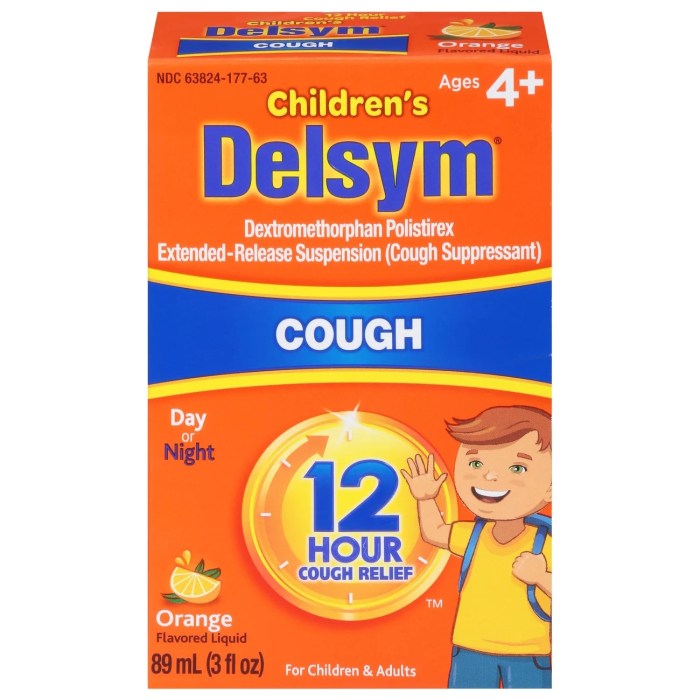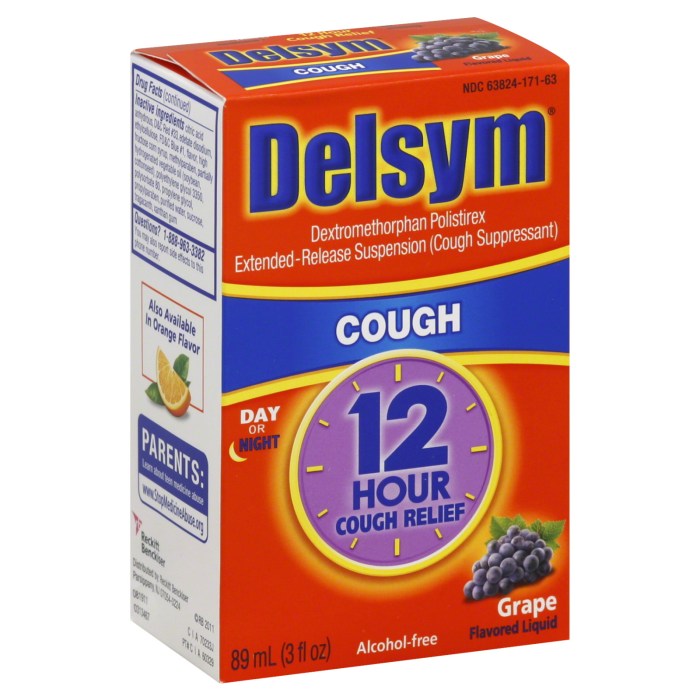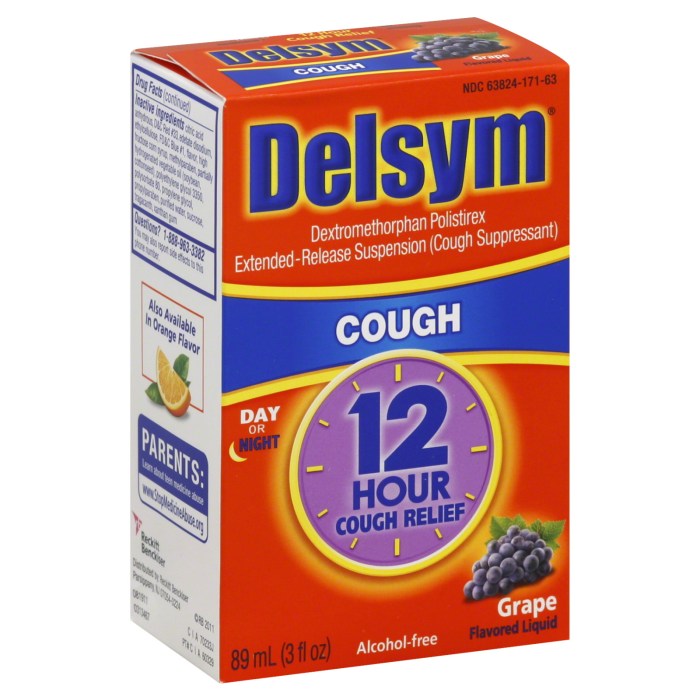Delsym vs robitussin how do they differ – Delsym vs Robitussin: how do they differ? This in-depth look explores the nuances between these common cough medications, delving into their active ingredients, dosages, potential side effects, and formulations. We’ll also examine their efficacy, cost, and appropriate usage for various situations, including children. Understanding these differences can empower you to make informed decisions about your cough relief.
Cough medications are a common over-the-counter remedy, but they aren’t all the same. This comparison aims to provide clarity on the key distinctions between Delsym and Robitussin, helping you choose the right medication for your specific needs. We’ll explore their active ingredients, how they work in your body, and how they might differ in terms of effectiveness and potential side effects.
Introduction to Cough Medications
Cough medications are a common remedy for relieving discomfort associated with various respiratory conditions. They aim to manage the symptoms of coughs, which can range from mild irritations to severe, debilitating issues. Understanding the different types of cough medications and their mechanisms of action can help individuals make informed decisions about their treatment options.Over-the-counter (OTC) cough medications come in various forms, including syrups, lozenges, and tablets.
The effectiveness of these medications depends on the specific active ingredients and their targeted effects on the body’s response to a cough. Choosing the right medication often involves considering the type of cough being experienced.
Types of Cough Medications
Cough medications are generally categorized into two main types: expectorants and suppressants. These categories are based on how they address the underlying cause and symptoms of the cough. Expectorants help to loosen and thin mucus, while suppressants aim to reduce the urge to cough.
Expectorants
Expectorants work by thinning and loosening mucus in the respiratory tract. This allows for easier removal of phlegm and reduces the feeling of congestion. Common examples include guaifenesin. Guaifenesin is a frequently used expectorant, often found in combination with other medications. The mechanism involves increasing the water content in the mucus, making it easier to cough up.
This can provide relief from coughs associated with colds, bronchitis, and other respiratory infections.
Suppressants
Suppressants act by reducing or eliminating the urge to cough. They often work by numbing or suppressing the cough reflex. Dextromethorphan (DM) is a common example of a cough suppressant. DM is a synthetic opioid-like compound that effectively reduces the intensity and frequency of coughing episodes. This type of medication is particularly useful for dry, hacking coughs that disrupt sleep or daily activities.
Comparison of Cough Medication Categories
| Category | Mechanism of Action | Types of Coughs | Examples |
|---|---|---|---|
| Expectorants | Thin and loosen mucus | Productive coughs (with phlegm) | Guaifenesin |
| Suppressants | Reduce or eliminate cough reflex | Dry, hacking coughs | Dextromethorphan (DM) |
Delsym and Robitussin: Active Ingredients
Delsym and Robitussin are common over-the-counter cough medications, but they differ significantly in their active ingredients and mechanisms of action. Understanding these differences can help individuals choose the most appropriate medication for their specific cough. This section delves into the active ingredients found in these products, comparing their chemical structures (where possible), and explaining their respective mechanisms of action.These distinctions are crucial for informed decision-making when selecting a cough remedy.
Knowing the active ingredients and their functions allows individuals to better understand how these medications work and, potentially, avoid adverse interactions or inappropriate use.
Active Ingredients and Chemical Structures, Delsym vs robitussin how do they differ
The active ingredients in Delsym and Robitussin are different, leading to different therapeutic effects. Delsym typically contains dextromethorphan, while Robitussin often contains guaifenesin. Direct chemical comparisons are difficult without detailed chemical structures, but the fundamental differences in chemical composition lead to varying pharmacological properties.
Mechanisms of Action
Different active ingredients affect the body in unique ways. Dextromethorphan, the active ingredient in Delsym, acts as a cough suppressant. It primarily works by blocking the transmission of cough signals in the central nervous system. Guaifenesin, the active ingredient in many Robitussin products, is an expectorant. It works by thinning the mucus in the respiratory tract, making it easier to cough up.
Dosage Forms and Therapeutic Classifications
| Active Ingredient | Dosage Forms | Therapeutic Classification |
|---|---|---|
| Dextromethorphan | Tablets, liquids, syrups | Cough suppressant |
| Guaifenesin | Tablets, liquids, syrups | Expectorant |
Understanding the differences between dextromethorphan and guaifenesin is vital for choosing the right medication. Dextromethorphan is effective for suppressing the cough reflex, while guaifenesin aids in clearing mucus. Selecting the appropriate medication depends on the underlying cause of the cough. If the cough is primarily irritating or bothersome, a cough suppressant like dextromethorphan might be beneficial. If the cough is associated with a buildup of mucus, an expectorant like guaifenesin is more suitable.
Dosage and Administration

Understanding the correct dosage and administration method is crucial for maximizing the effectiveness of cough medications while minimizing potential side effects. Different formulations and age groups require specific guidelines to ensure safe and optimal treatment. This section provides a detailed comparison of dosage recommendations for Delsym and Robitussin.
Dosage Guidelines for Delsym and Robitussin
Delsym and Robitussin, while both targeting coughs, utilize different active ingredients and mechanisms of action. This necessitates varying dosage guidelines. Delsym, containing dextromethorphan, is typically prescribed for suppressing the cough reflex. Robitussin, containing guaifenesin, is primarily focused on loosening phlegm and facilitating its expulsion. The dosage for each medication is dependent on the specific formulation and the patient’s age and condition.
Recommended Dosage for Adults
The typical adult dosage for Delsym, in its common tablet form, is usually 15mg to 30mg every four to six hours as needed. However, it’s vital to adhere to the specific instructions on the product label and consult a healthcare professional if unsure. Robitussin, available in various forms like tablets, syrups, and liquids, often recommends taking 100mg to 200mg every four to six hours as needed.
These figures are general guidelines, and specific dosages may vary based on the product and individual needs.
Dosage Variations for Different Age Groups
Dosage recommendations for children and adolescents differ significantly from adult dosages. Always consult a doctor or pharmacist for specific guidance on appropriate dosages for pediatric patients. The age-dependent dosages are critical to prevent potential adverse effects and ensure safe treatment. Dosage calculations for children are often based on weight and age, and it is essential to follow the directions carefully to avoid exceeding the safe limit.
Figuring out Delsym vs. Robitussin? They both tackle coughs, but their active ingredients differ. Knowing when to take fish oil supplements can be tricky too, and timing it right can be important for maximum effectiveness. For example, it’s often recommended to take fish oil with a meal to aid absorption.
Ultimately, understanding the nuances of each medication, like Delsym and Robitussin, is key to choosing the right one for your needs. This information can be even more critical when considering time to take fish oil alongside your cough medicine. Ultimately, comparing Delsym and Robitussin helps you pick the best fit for your cough.
Administration Methods
Both Delsym and Robitussin are available in various formulations. These include tablets, oral suspensions, and syrups. The choice of administration method is often dictated by the patient’s preference and the specific product. For instance, Delsym tablets are easy to swallow, whereas Robitussin oral suspensions may be better suited for children who may have difficulty swallowing tablets. The specific administration instructions should be clearly Artikeld on the product label.
Comparison of Dosage Forms
| Medication | Dosage Form | Description |
|---|---|---|
| Delsym | Tablets | Solid dosage form for oral administration, often containing 15mg or 30mg of dextromethorphan. |
| Delsym | Oral Suspension | Liquid form for oral administration, suitable for those who have difficulty swallowing tablets. Dosage may be adjusted to accommodate different ages and weights. |
| Robitussin | Tablets | Solid dosage form for oral administration, often containing 100mg or 200mg of guaifenesin. |
| Robitussin | Oral Suspension | Liquid form for oral administration, typically used for children and those who prefer a liquid medication. Dosage is often measured by milliliters. |
| Robitussin | Syrups | Liquid formulation with added sugars or flavorings. Doses are typically measured by teaspoons or milliliters. |
Potential Side Effects
Taking cough medicine can be helpful, but it’s crucial to be aware of potential side effects. Understanding the possible reactions can help you manage them effectively and ensure you’re making the best choices for your health. Both Delsym and Robitussin, while generally safe, can cause various side effects in some individuals.
Side Effects of Delsym and Robitussin
Delsym and Robitussin, while effective in managing coughs, can sometimes cause unwanted side effects. Knowing the potential side effects and how to recognize them can help you take the necessary steps to manage them. These side effects can range from mild to more severe, and their frequency can vary from person to person.
Comparing Potential Side Effects
The following table Artikels potential side effects, their relative frequency, and how to mitigate them. Note that individual responses to medication can vary, and this information should not be considered a substitute for professional medical advice.
| Side Effect | Delsym | Robitussin | Frequency | Mitigation Strategies |
|---|---|---|---|---|
| Drowsiness | Possible | Possible | Mild to Moderate | Avoid operating machinery or driving. Take the medication at bedtime if drowsiness is a concern. Drink plenty of water. |
| Headache | Rare | Rare | Mild to Moderate | Over-the-counter pain relievers like ibuprofen or acetaminophen can help. Hydration is important. |
| Nausea | Possible | Possible | Mild to Moderate | Take the medication with food. Small, frequent meals can help prevent nausea. Ginger or peppermint tea may also provide relief. |
| Dry Mouth | Possible | Possible | Mild to Moderate | Drink plenty of water throughout the day. Sugar-free hard candies or gum can also help. |
| Upset Stomach | Possible | Possible | Mild to Moderate | Take the medication with food or milk. Avoid taking it on an empty stomach. |
| Allergic Reactions (rare but serious) | Possible | Possible | Rare | Seek immediate medical attention if you experience difficulty breathing, hives, or swelling. |
Recognizing and Managing Side Effects
It’s essential to monitor yourself for any unusual symptoms after taking cough medicine. If you experience any side effects, especially those that are severe or persistent, contact your doctor or pharmacist immediately. They can assess the situation and provide personalized advice. Remember, the information provided here is not a substitute for professional medical advice.
So, you’re trying to figure out the difference between Delsym and Robitussin? It’s a common question, and while I can’t give medical advice, understanding the different ingredients is key. However, if you accidentally get a needle stick, knowing what to do is critical. First things first, immediately wash the wound thoroughly and report it to a healthcare professional.
Check out this helpful guide on what to do if you experience a sharps injury for more detailed information. Back to the cough medicine comparison, both often contain different active ingredients that affect how they work in your body, leading to varying degrees of effectiveness for different people.
Important Considerations
Always follow the dosage instructions provided by your doctor or pharmacist. Do not exceed the recommended dosage. If you have any underlying health conditions, discuss the use of these medications with your doctor first. This ensures the medication is safe and effective for your individual needs. It’s crucial to be mindful of potential side effects and seek medical attention if necessary.
Differences in Formulation and Use: Delsym Vs Robitussin How Do They Differ
Choosing between Delsym and Robitussin often comes down to personal preference and the specific type of cough you’re experiencing. Both medications aim to alleviate cough symptoms, but their formulations and intended uses can differ significantly. Understanding these nuances can help you make an informed decision about which medication might be best for your needs.The formulations of Delsym and Robitussin play a crucial role in their effectiveness.
Delsym, for example, is typically available in a liquid or tablet form, while Robitussin is often presented as a liquid syrup. These differences in presentation impact factors such as the speed of absorption and the duration of relief.
Formulations and Delivery Methods
Different formulations impact the way your body absorbs and processes the medication. Liquid or syrup formulations, like those commonly found in Robitussin, dissolve quickly, allowing for a faster onset of action. This is because the active ingredients are already in a dissolved state, ready for absorption. Conversely, tablet forms, such as those in Delsym, require digestion and breakdown in the stomach before absorption, resulting in a slightly slower onset.
The duration of relief can also vary depending on the formulation. While a liquid may provide shorter-term relief, a tablet can potentially offer extended symptom control.
Specific Use Cases and Preferences
The choice between Delsym and Robitussin often hinges on individual preferences and the specific nature of the cough. For instance, if you need immediate relief, a liquid formulation might be preferable. If you prefer a more controlled release and potentially longer-lasting effects, a tablet might be a better option. Furthermore, individuals with swallowing difficulties or those who prefer a less sticky texture might find a tablet more manageable.
Comparison of Formulations
| Feature | Delsym (Typically Tablets) | Robitussin (Typically Liquid Syrup) |
|---|---|---|
| Onset of Action | Slower, as absorption requires digestion | Faster, as ingredients are already dissolved |
| Duration of Action | Potentially longer, due to sustained release | Shorter, as the effect is generally more immediate |
| Consistency | Solid, easier to take with less potential for accidental spills | Liquid, can be messy to measure and may not be suitable for those with swallowing difficulties |
| Convenience | More convenient for those who prefer taking pills or have difficulty measuring liquids | More convenient for immediate relief, but potentially less convenient for prolonged use. |
| Suitability for Specific Needs | Better for those with swallowing issues, or who want controlled release | Better for those who need quick relief, or for children who may find the liquid more appealing. |
Over-the-Counter Use and Safety Considerations

Taking over-the-counter cough medications like Delsym and Robitussin can be a helpful way to manage coughs and associated symptoms. However, it’s crucial to use these medications safely and responsibly. Understanding the potential risks and precautions is key to avoiding unwanted side effects and ensuring your treatment is effective and safe.Using these medications responsibly and in accordance with the instructions provided is paramount for effective and safe treatment.
This involves adhering to the recommended dosages, recognizing potential interactions with other medications or substances, and understanding when to seek professional medical advice. This section provides essential information on the safe use of these medications.
Safe Use of Over-the-Counter Cough Medications
Safe use of over-the-counter cough medications involves understanding the potential risks and precautions. Always follow the instructions on the product label carefully. This includes the recommended dosage, frequency, and duration of use. Exceeding these guidelines can lead to adverse effects.
Precautions Before Use
Before taking any over-the-counter cough medication, it’s essential to consider certain precautions. These precautions help ensure the medication is appropriate for your specific situation and that any potential risks are minimized. Pay close attention to any potential allergies or sensitivities you might have to the ingredients in the medication. Also, if you have pre-existing medical conditions, such as asthma or heart problems, or are pregnant or breastfeeding, it’s crucial to consult your healthcare provider before taking any over-the-counter medication.
This proactive approach ensures a safe and informed decision regarding your health.
Potential Interactions with Other Medications or Substances
Certain medications and substances can interact with cough suppressants like Delsym and Robitussin, potentially leading to unforeseen side effects. This is particularly important if you’re already taking other prescription or over-the-counter medications, herbal remedies, or supplements. These interactions can modify the effects of the cough medication or create new, unwanted side effects. A doctor or pharmacist can provide valuable information about potential interactions based on your specific medical history and current medications.
Importance of Following Recommended Dosages
Adhering to the recommended dosages is critical for effective treatment and minimizing potential side effects. Taking more than the prescribed dose may not improve symptoms but could significantly increase the risk of adverse effects. Following the directions carefully, including the frequency and duration of use, is vital for optimal results and safety. Consistency in dosage administration is essential for the body to properly absorb and process the medication.
Ever wondered about the differences between Delsym and Robitussin? While those cough suppressants are helpful, it’s also important to consider your overall health. Knowing more about prostate health, for example, can impact your well-being in ways you might not expect. For more detailed information on prostate health, check out this helpful resource: things to know about prostate health.
Ultimately, understanding the nuances of these cough medications is key to making informed choices about your health and well-being.
When to Consult a Healthcare Professional
If your cough persists for more than a few weeks, worsens, or is accompanied by other concerning symptoms, such as fever, chest pain, or difficulty breathing, you should seek professional medical advice immediately. A healthcare professional can accurately diagnose the cause of your cough and recommend appropriate treatment options. Ignoring persistent or severe symptoms can delay proper treatment and potentially lead to more serious health complications.
Potential Drug Interactions Table
| Medication | Potential Interaction with Delsym/Robitussin | Possible Side Effects |
|---|---|---|
| Antihistamines | May enhance drowsiness | Drowsiness, dizziness, difficulty concentrating |
| Alcohol | May increase drowsiness | Drowsiness, impaired judgment, slowed reaction time |
| Monoamine oxidase inhibitors (MAOIs) | Potential for dangerous interactions | Hypertension, tachycardia, agitation |
| Certain antibiotics | May alter the metabolism of the cough suppressant | Possible changes in effectiveness or increased risk of side effects |
| Other cough suppressants | Potential for additive effects | Increased drowsiness, slowed respiratory rate |
Note: This table is not exhaustive. Consult with a healthcare professional or pharmacist for personalized information regarding potential interactions.
Specific Use Cases and Considerations for Children
Cough medications like Delsym and Robitussin can be helpful for children, but their use requires careful consideration. Dosage and potential side effects differ significantly between children and adults, making proper administration crucial. This section will detail the specific considerations and precautions when using these medications in pediatric patients.Understanding how children metabolize these medications is key to ensuring their safety and efficacy.
Children often have different physiological responses to drugs than adults, and their bodies process medications at varying rates. This means that dosages need to be adjusted for children to avoid potential complications.
Dosage and Administration in Children
Dosage guidelines for children are typically based on weight or age. These guidelines are designed to provide a safe and effective dose, but they should never be used as a substitute for medical advice. It’s essential to follow the specific dosage instructions provided on the medication label, as well as any instructions given by a healthcare professional. Carefully measuring the liquid medication using a calibrated measuring device is critical to ensure accuracy.
A doctor or pharmacist should be consulted to determine the appropriate dose for your child’s specific situation.
Potential Differences in Metabolism
Children’s bodies process medications differently from adults. Factors such as liver and kidney function, which are still developing in children, can affect how quickly the medication is broken down and eliminated from the body. This means that children may experience different effects or side effects compared to adults who take the same medication. Monitoring for signs of adverse reactions is crucial, and immediate medical attention should be sought if any concerning symptoms arise.
Importance of Careful Monitoring and Supervision
Administering medications to children requires close supervision. Always ensure the child is properly monitored while taking the medication and for a period afterward to observe any potential side effects. A responsible adult should be present to ensure proper administration and observe the child for any adverse reactions. This supervision is crucial for children who may not fully understand the importance of following instructions.
Importance of Not Exceeding Recommended Dosages
Exceeding the recommended dosage for children can lead to serious side effects. Overdosing can overwhelm the child’s developing systems, potentially causing harm or complications. Always adhere to the prescribed dosage and never increase it without consulting a healthcare professional. This principle is essential for ensuring the safety and well-being of the child.
Scenarios Requiring a Doctor’s Consultation
Several scenarios necessitate a consultation with a doctor before administering cough medications to children. If a child has a pre-existing medical condition, such as asthma or heart problems, it’s vital to consult a doctor to determine the suitability and appropriate dosage of the medication. Similarly, if a child is experiencing severe cough symptoms, or the cough persists for an extended period, seeking professional medical advice is crucial.
Additionally, if a child experiences any unusual symptoms after taking the medication, such as difficulty breathing or excessive drowsiness, immediate medical attention is necessary.
Comparing efficacy and cost
Deciding between Delsym and Robitussin often comes down to individual needs and preferences. Understanding the scientific backing behind each medication’s efficacy, the potential cost differences, and the duration of relief is crucial for making an informed choice. This section delves into these factors, allowing you to compare the two cough suppressants more effectively.Efficacy of each medication, as supported by scientific evidence, varies depending on the specific formulation and the underlying cause of the cough.
A deeper understanding of these differences is essential for determining which medication is best suited for your particular situation.
Efficacy Comparison
The efficacy of cough suppressants like Delsym and Robitussin is often assessed by their ability to reduce cough frequency and intensity. Delsym, containing dextromethorphan, primarily acts as a central nervous system suppressant, reducing the urge to cough. Robitussin, in various formulations, may contain guaifenesin, which helps thin mucus and facilitate its removal. While Robitussin can be helpful for productive coughs (those with phlegm), Delsym is more effective for dry, non-productive coughs.
Scientific studies have shown varying degrees of efficacy for each product, depending on the specific formulation and the individual’s response.
Cost Analysis
The cost of cough medications can vary significantly based on the dosage form, brand, and quantity purchased. Comparing the cost of different dosage forms for both Delsym and Robitussin is vital for budget-conscious consumers. For example, a 100-count bottle of Delsym might cost more than a comparable quantity of Robitussin, but this can vary widely depending on the specific pharmacy and the type of formulation.
Duration of Relief
The duration of relief offered by cough medications can also differ. Delsym, due to its central nervous system effects, often provides a longer duration of cough suppression compared to Robitussin, which might need more frequent dosing. However, individual experiences can vary based on factors such as the severity of the cough, the individual’s metabolism, and the specific formulation of the medication.
Comparative Cost and Efficacy Table
| Feature | Delsym | Robitussin |
|---|---|---|
| Active Ingredient(s) | Dextromethorphan | Guaifenesin (often) + Dextromethorphan (some formulations) |
| Primary Efficacy | Dry, non-productive coughs | Productive coughs (with phlegm), and loosening congestion |
| Typical Cost (per 100 count) | $10-15 | $8-12 |
| Duration of Relief | Generally longer lasting | Often shorter lasting; needs more frequent dosing |
Note: Costs are estimates and can vary based on location, pharmacy, and specific dosage form.
Summary
In conclusion, while both Delsym and Robitussin are effective cough suppressants, they differ in their active ingredients, formulations, and potential side effects. This comparison highlights the importance of understanding these nuances to ensure appropriate usage and avoid potential complications. Always consult with a healthcare professional before using any medication, especially if you have underlying health conditions or are caring for children.













